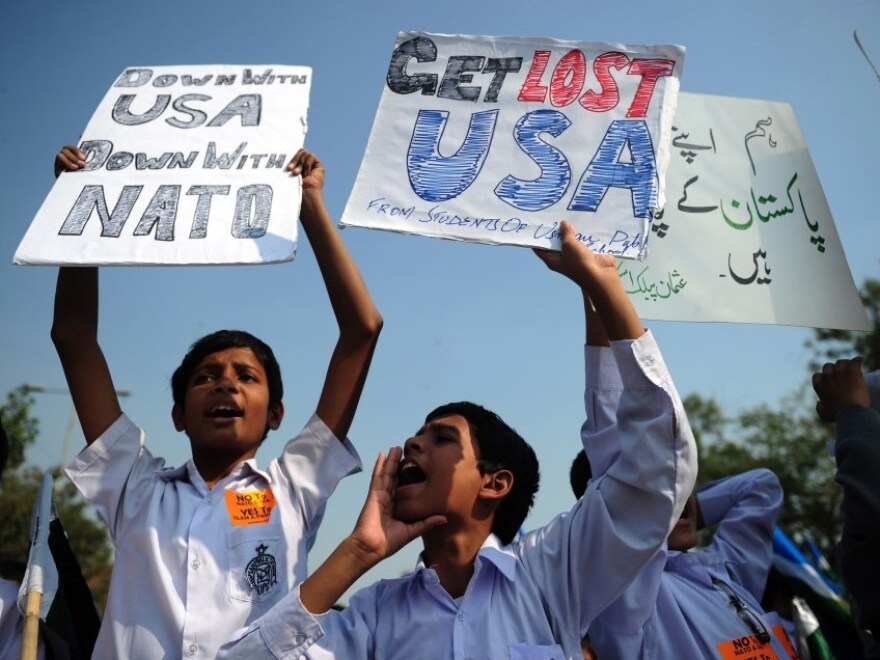In Pakistan, transit routes for NATO supply trucks heading to Afghanistan remain shut. The CIA drone missile program has gone quiet in Pakistan's tribal area. Pakistan's government has called for a re-negotiation of its troubled relationship with the U.S.
All of this is fallout from an attack on the Pakistan-Afghanistan border last month in which NATO fire from helicopter gunships killed 24 Pakistani soldiers.
The Pentagon said Thursday that both the American and Pakistani forces made mistakes that led to the shooting. The mistakes cited included a lack of coordination between the two sides, and incorrect map information that was exchanged, according to the Pentagon. However, the shooting was described as a blunder and not an intentional attack on Pakistani troops, as Pakistan has said.
We'll make sure that we do everything we can on both sides of the border — Pakistanis, Americans and Afghans — to make sure something like that will never happen again.
President Obama has previously expressed condolences to the families of the Pakistani troops who died when NATO forces crossed into Pakistani territory and obliterated two border posts on Nov. 26. But the U.S. has not issued a formal apology.
Meanwhile, U.S. Ambassador Cameron Munter has been engaged in diplomatic damage control in Islamabad, the Pakistani capital.
"It was not intentional that this tragic accident took place," Munter said recently. "We'll make sure that we do everything we can on both sides of the border — Pakistanis, Americans and Afghans — to make sure something like that will never happen again."
But Pakistan's military brass says the attack was no accident. The generals say that Pakistani officers had established communications with NATO during the attack, and that the continuation of it was "blatant aggression."
"It was a slaughter. They continued doing it for more than an hour. So if someone says it was by mistake — we're not buying that," says Javed Ashraf Qazi, the former head of Pakistan's intelligence agency, ISI.
Army Chief Gen. Ashfaq Kayani has issued an order allowing troops to retaliate in the event of any future attack.
Qazi says the high command had no choice. "If troops perceive that we are sitting ducks and the Americans can come at will and hit us and go back, and our high command will not allow us to fire back, then that high command will lose all respect."
Anti-American Atmosphere
Pakistani militants and some clerics have banded together vowing to defend Pakistan from "outside aggression." Social commentator Pervez Hoodbhoy says that in such a hot anti-American climate, the army and military intelligence chiefs can no longer be seen as even remotely aligned with the U.S.
"They are afraid of being called American sympathizers, allies, agents or whatever," he says. "Particularly after the Osama bin Laden killing, they have now sought to distance themselves from the Americans by as big an amount as possible."
Gen. Kayani and spy director Shuja Pasha are deeply suspicious of American unilateralism of the sort exercised in bin Laden's killing. Both were humiliated by the secret U.S. raid.

But Mohammad Malick, Islamabad editor of the national daily The News,says a tough stance now over the NATO attack on the border posts at Salalah is restoring their tarnished image as guardians of the nation.
"The public sentiment, the killings, they have really caused a furor in the country," he says. "It should not be underestimated by any account. And Salalah in one way — ironically in one level — it was best thing that could have happened to the military."
Pakistan Cuts Cooperation
Pakistan's blockade of NATO trucks into Afghanistan has shut down half of all NATO supplies. And Pakistan continues to refuse to oblige the Americans in their Afghan strategy by pointedly not pursuing the Haqqani militant network that picks off NATO troops before retreating to bases inside Pakistan.
That has provoked accusations of Pakistani complicity. Analyst and newspaper editor Rashed Rahman says the central problem in the relationship is what he calls the "proxy war that the Pakistan military is waging through the Taliban in Afghanistan."
"That is the core issue. It's the unstated elephant in the room," he says. "So unless you get to grips with that, everything is fraught and liable to go through ups and downs."
Malick maintains that the army is not anti-American. But he says the cost of being an American ally has become too great.
"They realize that if they do what the Americans want them to do in the manner they want it done, in the long term, the consequences would be too great for us," he says. "We want the same things, but we know what can be and what can't be done."
Copyright 2020 NPR. To see more, visit https://www.npr.org. 9(MDAxNDQ2NDAxMDEyNzU2NzM2ODA3ZGI1ZA001))




